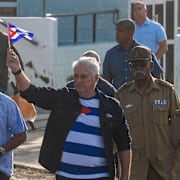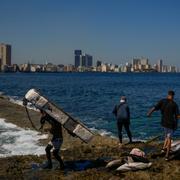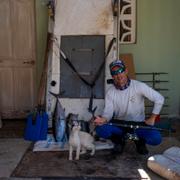
Kuba släpper 553 fångar om de stryks från terrorlista
I utbyte mot att Vita huset tar bort Kuba från USA:s lista över länder som finansierar terrorism uppger Havanna att de släpper 553 politiska fångar fria, rapporterar Reuters.
Landets utrikesminister Bruno Rodriguez välkomnar Joe Bidens beslut, men önskar att han gick längre.
– USA tar steg i rätt rikting, men blockaden ligger kvar, säger han.
Donald Trump kommer ha möjlighet att häva avtalet när han tillträder på presidentposten på måndag. Hans tillträdande nationelle säkerhetsrådgivare Mike Waltz sågar däremot inte avtalet i sin helhet.
– Vi gillar det inte, men människor kommer i alla fall att släppas fria, säger han till Fox News enligt Bloomberg.
bakgrund
USA:s handelsembargo mot Kuba
Wikipedia (en)
The United States embargo against Cuba has prevented U.S. businesses from conducting trade or commerce with Cuban interests since 1958. Modern diplomatic relations are cold, stemming from historic conflict and divergent political ideologies. U.S. economic sanctions against Cuba are comprehensive and impact all sectors of the Cuban economy. It is the most enduring trade embargo in modern history. The U.S. government first banned the sale of weaponry to Cuba via an arms embargo on March 14, 1958, during the U.S.-backed Fulgencio Batista regime. The Cuban Revolution saw to the nationalization of Cuba, high U.S. imports taxes, and forfeiture of U.S.-owned economic assets, including oil refineries, without compensation. The U.S. government retaliated in 1960 with an extended embargo on all exports to Cuba, with exception for food and medicine. Cuba held nuclear missiles for the Soviet Union during the 1962 Cuban Missile Crisis, which led the U.S. to impose a full-scale blockade against the Island. The severity of the sanctions brought on by the U.S. has had the United Nations pass annual resolutions to suspend the embargo intermittently since 1992.
The embargo is enforced mainly through the Trading with the Enemy Act of 1917, the Foreign Assistance Act of 1961, the Cuban Assets Control Regulations of 1963, the Cuban Democracy Act of 1992, the Helms–Burton Act of 1996, and the Trade Sanction Reform and Export Enhancement Act of 2000. The Helms-Burton Act further restricted U.S. citizens from doing commerce in or with Cuba, and mandated restrictions on giving public or private assistance to any successor government unless and until certain claims against the Cuban government were met. The U.S. expanded the trade embargo by disallowing foreign U.S. corporate subsidiaries to trade with Cuba in 1999 and later authorized the sale of food and humanitarian products in 2000. Political scientist William M. LeoGrande summarized that, while the embargo against Cuba is 'the oldest and most comprehensive U.S. economic sanctions regime against any country in the world ... [it] has never been effective at achieving its principal purpose: forcing Cuba's revolutionary regime out of power or bending it to Washington's will.'
Omni är politiskt obundna och oberoende. Vi strävar efter att ge fler perspektiv på nyheterna. Har du frågor eller synpunkter kring vår rapportering? Kontakta redaktionen


